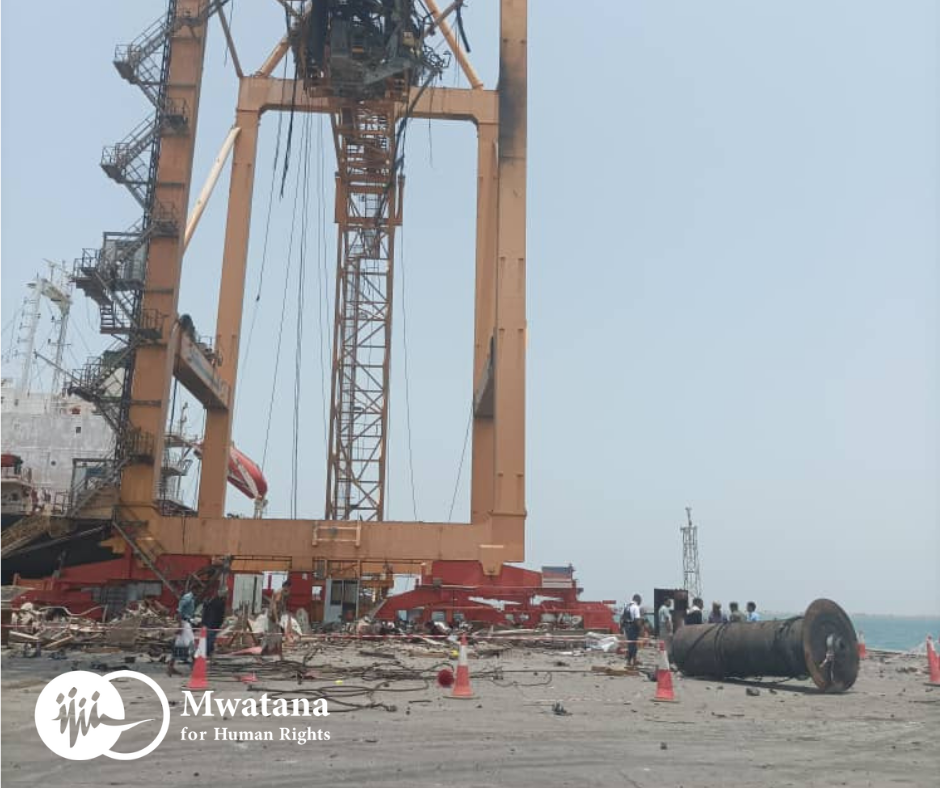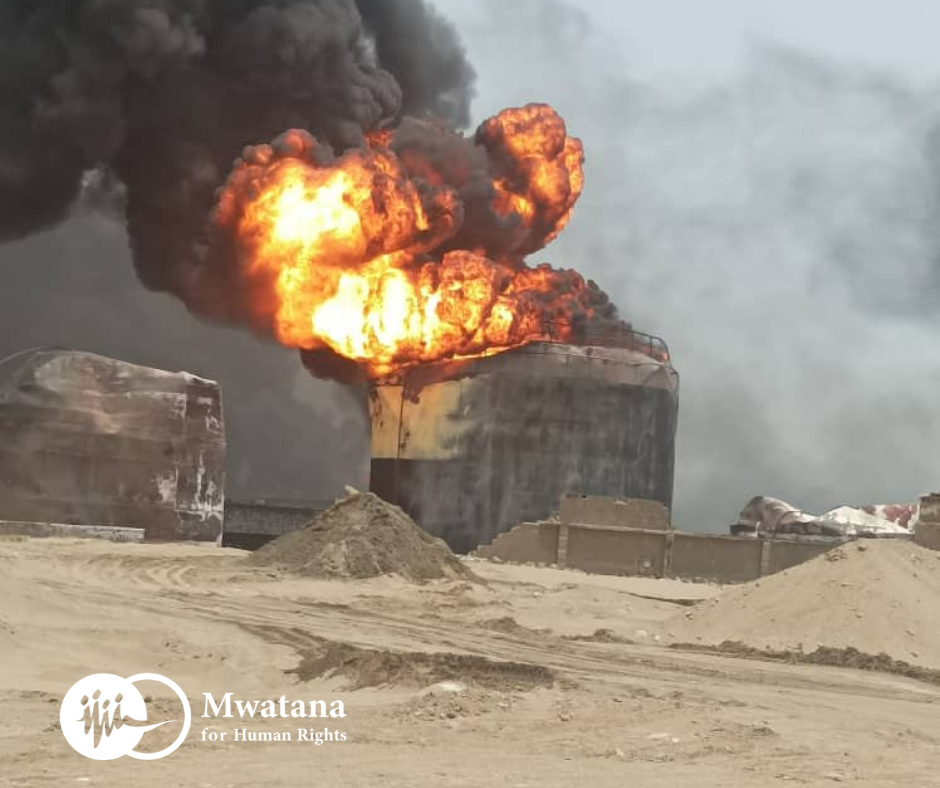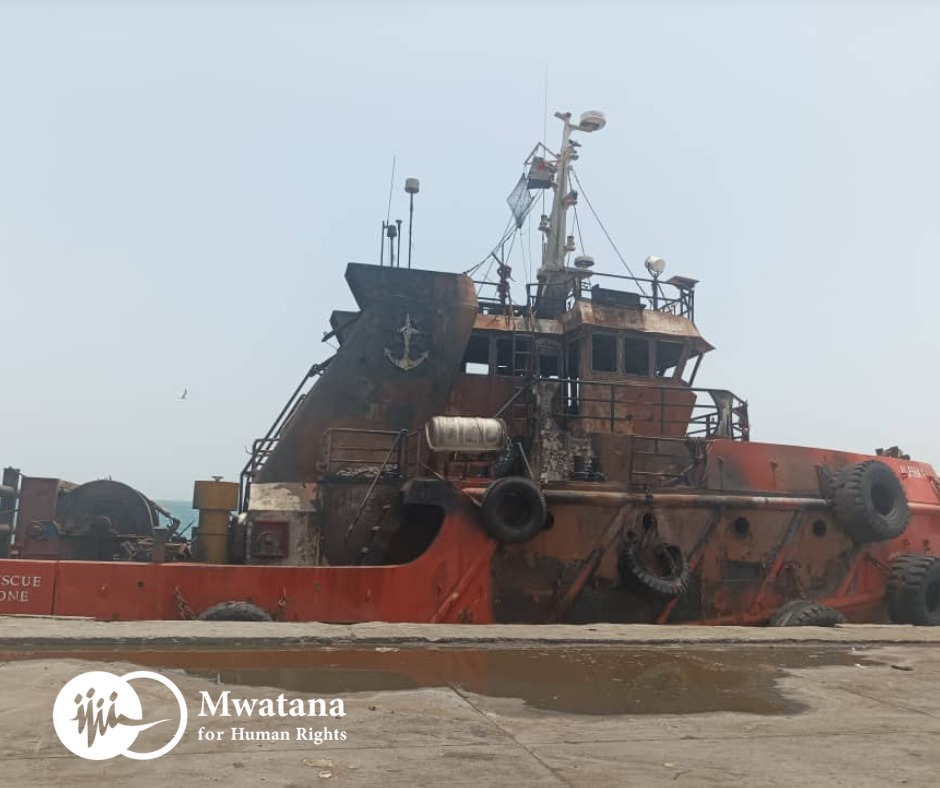
Nine Workers Killed, Eighty Injured, Dozens of Families Displaced, and Large-Scale Destruction

Mwatana for Human Rights stated that its field teams are actively documenting the impact of the Israeli airstrikes on the ports of Hodeidah and Saleef, as well as on electrical power stations in Hodeidah city, located in northwest Yemen.

The strikes, which occurred yesterday evening, targeted civilian infrastructure that had been rebuilt and enhanced with the support of UN agencies, international donors, and the global community. This infrastructure is vital, as Hodeidah port handles over 80% of Yemen’s humanitarian aid, essential goods, and fuel, which more than 28 million Yemenis depend on for survival. Over the past decade of conflict, these shipments have been meticulously inspected and monitored by the United Nations Verification and Inspection Mechanism for Yemen (UNVIM).
Throughout Yemen’s conflict, the UN Security Council has repeatedly called for the complete and sustainable reopening of Hodeidah and Saleef ports and all Yemeni ports. It has emphasized the importance of keeping these ports operational and accessible for commercial and humanitarian imports, including food, fuel, medical supplies, and relief items. The Council has urged all parties to "facilitate the immediate access and distribution of these essential imports to all civilian populations across the country." The Council expressed "grave concern" over the impact of restrictions on commercial and humanitarian imports on the humanitarian situation, noting that 20.7 million people in Yemen require some form of humanitarian or protection assistance, with approximately 9.8 million in urgent need, according to the UN Office for the Coordination of Humanitarian Affairs (OCHA). The importance of Hodeidah port for millions of residents has been consistently underscored by UN agencies and international and local humanitarian and human rights organizations throughout the decade-long conflict.
On December 21, 2018, the UN Security Council adopted Resolution 2541, calling for an immediate ceasefire in Hodeidah city and the ports of Hodeidah, Saleef, and Ras Isa. The resolution also called for an enhanced UN presence and efforts Hodeidah and these three ports, leading to a coordinated effort to support and strengthen the Yemen Red Sea Ports Corporation. In response, the United Nations Development Programme (UNDP) conducted an assessment from June 15 to July 8, 2019, with experts from the Port of Rotterdam, focusing on the ports of Hodeidah, Saleef, and Ras Isa. Based on their findings, a comprehensive package worth €46.57 million was approved and implemented in three phases. The primary goals were to maintain port operations and restore them to pre-war conditions, facilitating the entry of vital humanitarian aid, commercial shipments, fuel, and essential goods, including medical supplies. Key components of this initiative included port restoration, capacity building, and operational improvements. Priority tasks included replacing navigational aids at the main port, renewing the training center, enhancing surrounding lighting, and resuming container handling operations. Efforts were also made to restore or improve the safety and sustainability of port operations and assets, and to enhance the management and inspection processes. The UNDP led this initiative in close coordination with relevant authorities, the United Nations Mission to Support the Hodeidah Agreement (UNMHA), the United Nations Verification and Inspection Mechanism for Yemen (UNVIM), the World Food Programme (WFP), and with support from international donors.

Mwatana for Human Rights confirmed through field visits to hospitals and medical facilities that nine port workers were killed and more than eighty injured in six Israeli airstrikes. The attacks, which took place at 5:50 p.m., on Saturday, targeted oil facilities and fuel tanks at Hodeidah port, causing significant damage to the port’s gantry cranes and destroying or partially damaging around 43 tanks and transport cisterns. Additionally, the central power station located in Al-Katheeb area of Al-Saleef district was hit, destroying three fuel tanks and taking the power supply stations in Hodeidah city offline. This caused extensive damage and led to massive fires that firefighting teams have been unable to extinguish, which are still burning into the second day. The airstrikes triggered a large-scale displacement of residents within the affected areas. Mwatana estimates that approximately 100 families from Al-Katheeb area, home to electricity plant workers, have been displaced, and around 150 families from the Hodeidah port area have fled to central Hodeidah city and Sana’a governorate.

Mwatana for Human Rights stated that the Israeli attacks on civilian infrastructure in Hodeidah constitute war crimes, violating the protections of international humanitarian law for civilian objects and infrastructure. These attacks also violated the principles of proportionality, protection, and distinction, undermining the safeguards afforded to civilian objects under Article 54 of the Protocol I Additional to the Geneva Conventions. This article prohibits "the deliberate restriction or obstruction of essential food supplies or the deliberate destruction of agricultural areas, crops, livestock, water installations, and irrigation networks necessary for the survival of the civilian population." Article 147 of the Fourth Geneva Convention considers the "extensive and unlawful destruction of protected properties and installations" as criminal acts and grave breaches of the Convention. In accordance with Rule 4(a) of Article 8 of the Rome Statute of the International Criminal Court, which states that "the extensive destruction and appropriation of property not justified by military necessity and carried out unlawfully and wantonly" constitutes a serious war crime. Additionally, paragraph (b) of Article 8 of the Rome Statute specifies that "intentionally directing attacks against civilian objects, which are not military objectives," and "launching an attack with the knowledge that it will cause incidental loss of life or injury to civilians, damage to civilian objects, or widespread, long-term, and severe damage to the natural environment which would be clearly excessive in relation to the concrete and direct overall military advantage anticipated," and "intentionally attacking or bombarding towns, villages, dwellings, or buildings which are undefended and which are not military objectives by any means whatsoever," and "intentionally directing attacks against buildings, materials, medical units, and transport, and personnel using the distinctive emblems of the Geneva Conventions in conformity with international law," and "intentionally using starvation of civilians as a method of warfare by depriving them of objects indispensable to their survival, including wilfully impeding relief supplies as provided for under the Geneva Conventions," are considered serious violations of the laws and customs applicable in international armed conflict within the established framework of international law.
Mwatana for Human Rights has called for an independent international investigation and urged the international community to take responsibility and act decisively to prevent the escalation of violence that could engulf the Middle East and the world in new cycles of atrocities and violations. The briefing emphasized that the rampant and unrestrained Israeli military machine, devoid of any legal, humanitarian, or ethical obligations, must be curbed. Mwatana urged the international community to rein in the Israeli war machine, which transitions the region from one horrifying conflict to another with impunity, despite being embroiled in a torrent of atrocities, bloodshed, and violations for over eight months.